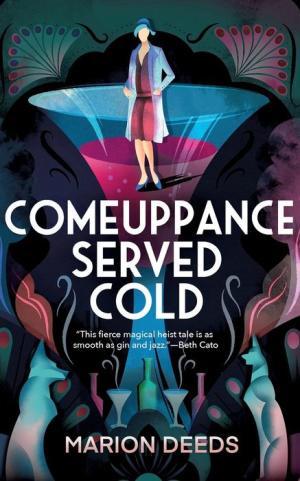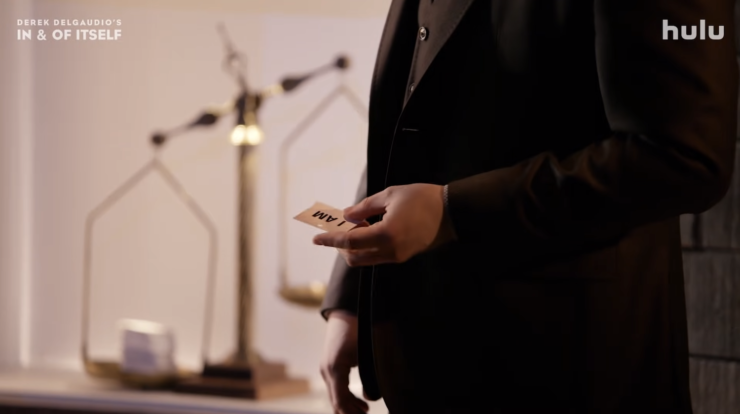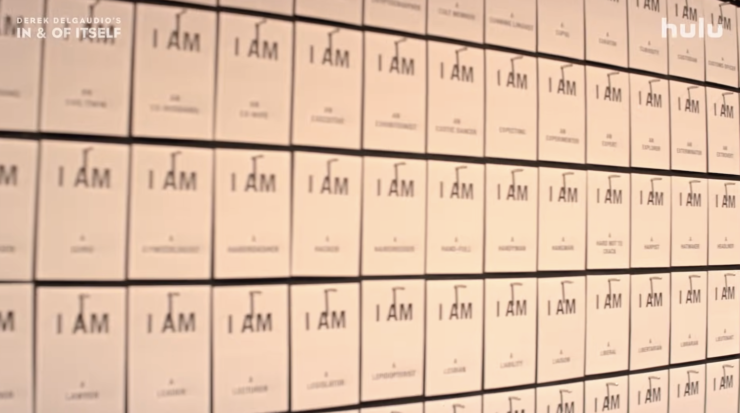Derek DelGaudio’s In & Of Itself quietly appeared on Hulu in early 2021. DelGaudio originally performed the one-man show more than 500 times in New York for in-person audiences. The filmed version of In & Of Itself streaming on Hulu stitches together those live performances, culminating in a profound exploration of identity, storytelling, and self-perception.
Spoiler warning: I am going to do my best, in the short paragraph that follows, to describe In & Of Itself to you. But before you read on, consider whether you want to know what little, spoiler-free information I have to offer. Derek DelGaudio’s show is best consumed with zero preconceptions. The broad strokes won’t ruin it for you, but I want you to have the chance to go in completely fresh (it really is worth experiencing that way, if you can!). Beyond the very next paragraph, major spoilers follow.
***
In & Of Itself is part magic act, part storytelling performance based in oral tradition, part mentalism. DelGaudio blurs the lines between the art forms and engages the audience on a deep, philosophical level, tapping into a spectrum of emotions along the way, with moments of sorrow and regret as well as humor and joy. (You can watch the trailer here, if you want to get a sense of how it all works, but again, I recommend going in cold!) Taken as a whole, the final product explores identity, stories, and how our experiences—real or imagined, fact or fiction—shape us.
Despite my attempt above, In & Of Itself evades explanation. Your viewing experience and reaction will differ from mine, just as my first time watching differed from those of the myriad people to whom I’ve recommended the performance.
The first of those people was my mom. I texted her, stunned, after finishing In & Of Itself. “Watch it as soon as you can,” I told her. Later, she called me sobbing. “I…don’t know why I’m crying,’ she said, then, breathless: “Thank you for sharing it with me.”
The cascade began, and she relayed to me tales of her various friends and coworkers who watched In & Of Itself’s final moments teary-eyed, still processing their emotions. They couldn’t pinpoint why, but the show had touched them, affecting them on a deep, visceral level.
One year after its Hulu debut, I watched In & Of Itself a second time, and a clear message emerged. Stories shape us. When we suspend our disbelief for the latest novel or big-budget movie, we unlock a portion of ourselves that’s normally hidden. We subject ourselves to new realities, releasing our worldly tethers for a short time. In doing so, we allow fiction to restitch the fabric of our beings. When we close the final page of a book, we return to our world changed, even if the transformation is slight.
In & Of Itself validates what we, as readers, know deep down to be true: Stories have power. And we can wield that power to better ourselves. Change sparked by a story can be as real as the growth we undergo in real life through loss, heartbreak, love, and friendship.
Buy the Book


Comeuppance Served Cold
We flip a book’s front cover as though it’s a door beckoning us into another world, where explanations don’t truly matter. We devour worldbuilding and detail, but we don’t search for the veil or the hidden mirrors making us believe what we’re reading. Instead, we let our guard down and allow ourselves to bask in the story laid out for us. Reading is an act of vulnerability, and we must accept that consuming a story may alter the way we think and feel.
Within the first few minutes of In & Of Itself, DelGaudio announces that the audience—in our case, the viewer at home—isn’t likely to believe anything he says. That’s why, according to DelGaudio, he’ll tell the truth. There’s freedom in knowing your audience won’t truly believe what’s about to happen. He undermines expectations early with magic tricks and sleight of hand. He asks us—through actions, not words—to leave our preconceptions at the door. Suspend your disbelief, and allow In & Of Itself to open doors within you.
DelGaudio builds…trust? Maybe the wrong word. A rapport, certainly, a temporary nonverbal contract. His audience understands they’re being “tricked,” to an extent. But that’s not the point. In a simple magic show, maybe it is. But not here. Instead, In & Of Itself asks the viewer to dive deeper, to ignore the questions of how DelGaudio performs the tricks. If you watch the performance seeking explanations, trying to figure out the mechanics—a hidden device, an accidental reveal, a slip-up—you’ll emerge disappointed. In & Of Itself lays its plans bare right from the get-go. Your belief in this thing doesn’t matter. What does matter then? How you react to the stories within, and whether you allow them to work their actual magic.
During one segment of the show, DelGaudio promises (and delivers) an on-stage transformation. He brings a random audience member to the stage and has them pick from a stack of letters. Turning to the audience, he declares that we’re about to see the transformation firsthand.
As the audience members read the letters silently to themselves (the Hulu edit treats us to a handful of participants), DelGaudio makes good on his promise, and we see displays of raw emotion in front of an awestruck audience. He gives the participants time to recover, then asks if they’re willing to share the contents of the letters.
In the letters, the loved ones of the readers have graced the pages with words of praise, love, and appreciation. We witness the participants as they internalize the words written for them by the people they care about, and who care for them. We also watch as they wonder, sometimes aloud, how DelGaudio got his hands on the letters, how he could have possibly known, or arranged, or prepared for them to be in the audience at all. “I don’t understand,” says one participant. “I know,” replies DelGaudio. Understanding isn’t the goal.
Perhaps some viewers will seek an explanation, as one of my friends did while we watched In & Of Itself together. “Maybe he did a social media deep dive,” he said, then spitballing various other possibilities. But in my mind, to hunt for the “how” is to miss the “why.” In this case, the “why” is a moment of purity. A human reacting to the kind words of another. A person basking, for a moment, in the love surrounding them, summoned seemingly out of thin air by DelGaudio.
Wanting to know how DelGaudio did it was the furthest thing from my mind. Instead, I watched tearfully while real people underwent the metamorphosis he had promised.
In & Of Itself overflows with these moments. At another point in the show, DelGaudio tells a story about his upbringing, and he does so largely unaided by illusions or sleight of hand. He talks about his mother, and how her sexual orientation led him to hide things about his home life from kids at school. He explains how he took drastic measures to keep his mom’s identity as a proud lesbian a secret.
In describing his actions, DelGaudio clearly feels some shame and regret over how he acted as a kid. But he uses the story to make the same point I’m fighting for here: stories have impact. The audience, upon hearing his story, probably ascribes certain identifiers to him, none of them flattering. I certainly did. Flip the script, though, and ask yourself how his story changed you. DelGaudio’s less-than-flattering story (whether or not it’s true) shaped your perception of him, and perhaps also made you think in a new way…
The distinction between stories making us think about others and allowing us to look inward is slim but important, and DelGaudio plays in that nebulous zone to marvelous effect. He masterfully guides us along, collecting the manufactured but meaningful moments of the entire performance throughout the show’s runtime, allowing the connections to build and resonate. Then, in the final moments, he engages in a sweeping feat of mentalism that unilaterally leaves the studio audiences (and me, at home) utterly shocked.
One final time here, I urge you to turn away and come back after you’ve seen In & Of Itself. The text below spoils the show’s biggest, most sustained surprise.
…
…

Before each performance, audience members were asked to pick an “identity” from a wall of hundreds. Each identity was a single word or phrase that might describe someone—some practical, some fun, some more idealistic. Think “reader,” “mother,” “moviegoer,” “ninja,” “oracle,” or “accountant.” In the final moments of In & Of Itself, DelGaudio asks anyone who picked something that they truly feel represents them to stand. He looks each person in the eye and proceeds to acknowledge their chosen identities one by one.
Watching these final minutes of the performance, I felt an overwhelming surge of emotion. Some of the audience members burst into tears when DelGaudio matches their identity to them. Others laugh. Others smile meaningfully, or even ruefully. Each individual realizes, for a moment, that their identity, the card they chose, is the product of stories. The stories they’ve lived, heard, told, or read. The stories they made up, the stories they embellished, and the stories they didn’t or can’t quite believe.
Every person in the room, and by extension every viewer of In & Of Itself, watches as these people realize that they are the culmination of infinite stories. Fact and fiction contribute to the human experience in equal measure, and it’s okay to allow a story into your heart, even when you know it isn’t true. We’re allowed to feel deeply even when the source of the emotion isn’t couched in reality. In & Of Itself lives and breathes this lesson, teaching and abiding by it in a single, cohesive bundle of emotion, epiphany, and wonder.
Take the lessons available in DelGaudio’s performance, keep them in mind, and use them as you read your next fantasy obsession: With an open mind and a bit of fiction, change can be a welcome, refreshing, truly life-affirming thing.
Cole Rush writes words. A lot of them. For the most part, you can find those words at The Quill To Live or on Twitter @ColeRush1. He voraciously reads epic fantasy and science-fiction, seeking out stories of gargantuan proportions and devouring them with a bookwormish fervor. His favorite books are: The Divine Cities Series by Robert Jackson Bennett, The Long Way To A Small, Angry Planet by Becky Chambers, and The House In The Cerulean Sea by TJ Klune.











The other element I found so impactful was that the identities the audience had chosen were in fact just one tiny piece of who they are and/or what others see them as – a word cannot actually capture their full identity. When a woman reads her letter with loving words from her father outloud, we then saw her as more than a “nerd,” (the identity she chose) but also as a daughter because we gained another story to attribute to her. When Derek tells us about his two moms, we see him differently because we have another story. But I can only know my own identity in full, because only I know all of MY stories – real or fictional.
Fantastic movie. But could have focused more on the magic.
Very well written. I agree w you. During the documentary I was emotionally being torn by his stories and the actions played out. I wasn’t thinking at all on how it was done. Powerful movie. I’ve recommended to many. Thx for your writing
I had never seen the movie until I read this. It makes me want to dive deeper into this sort of entertainment.
I saw the film on Hulu shortly after it came out due to some rave reviews and was just floored. At nearly every turn when I think I would have felt upset at or even hostile towards being manipulated emotionally in lesser hands, I found myself turning into the skid instead to embrace it all. While I started to suss out a couple ways that the big card/label set piece towards the end could’ve been pulled off, I don’t want to know.
I had the pleasure of seeing the show itself live (a few blocks from Union Square in Manhattan) and it was a fantastic experience. The film is a great complementary piece, and definitely captured some of the magic of seeing it live – but its never the same, is it? In person I felt like his amazing demonstration of his total control over a deck of cards had a lot more punch/impact. A lot of the “tricks” were really miracles of logistics – which we discussed at length after the show. Did he have someone feeding him via an earpiece what card we had picked? Had he memorized it? What happens if the person whose letters he had picked got a cold?
That said I loved seeing “my” show from a different perspective – to hear different entries from the journal, to see more letters read, etc. We never did go up to find the brick, but I have no doubt it was there.
PS – In case anyone is curious, I selected “I am Human” – the only card that I felt didn’t pigeonhole you into a role. My wife must have had a similar idea, she independently picked “I am Multitudes”. I gave him a nod when he recognized me as “Human” :).
Thanks for sharing, Daniel. (<—Not sarcastic!)
i was a history major in college — what drew me to the art of storytelling is why i chose history. I really enjoyed telling the stories to kids and watching them enjoy it. The art of storytelling, and understanding perspective, is everything